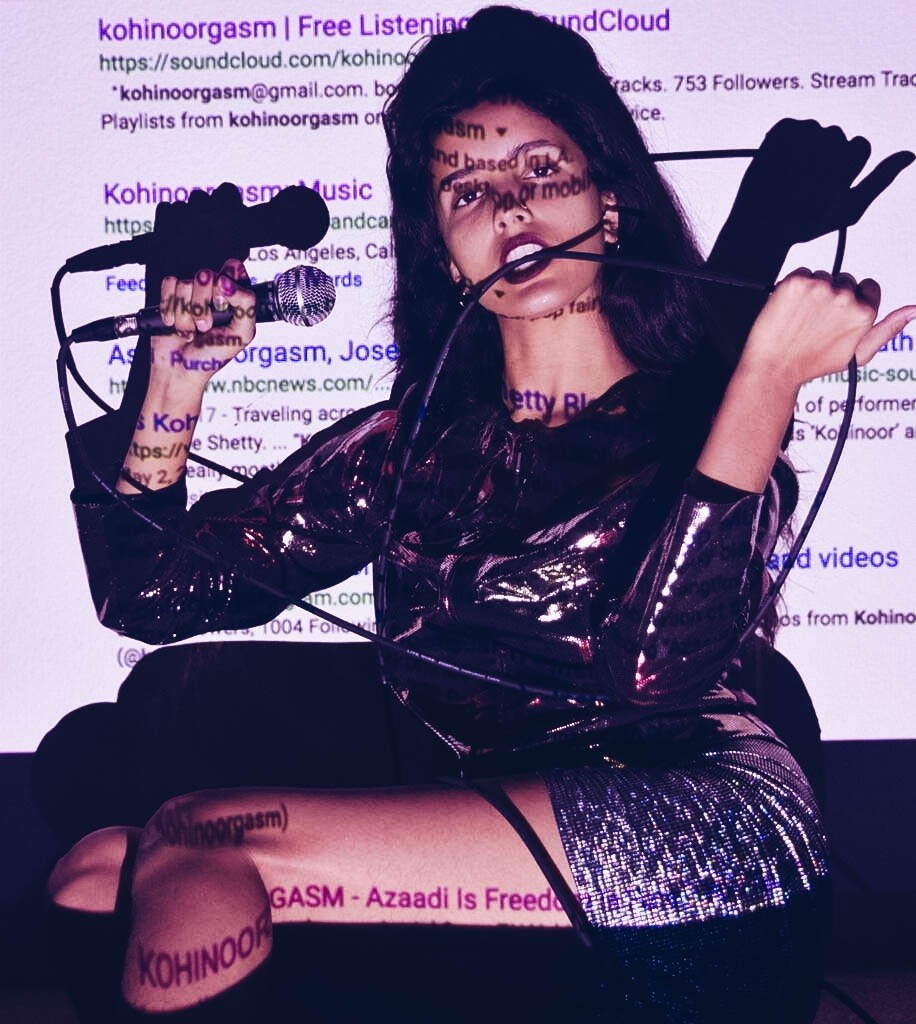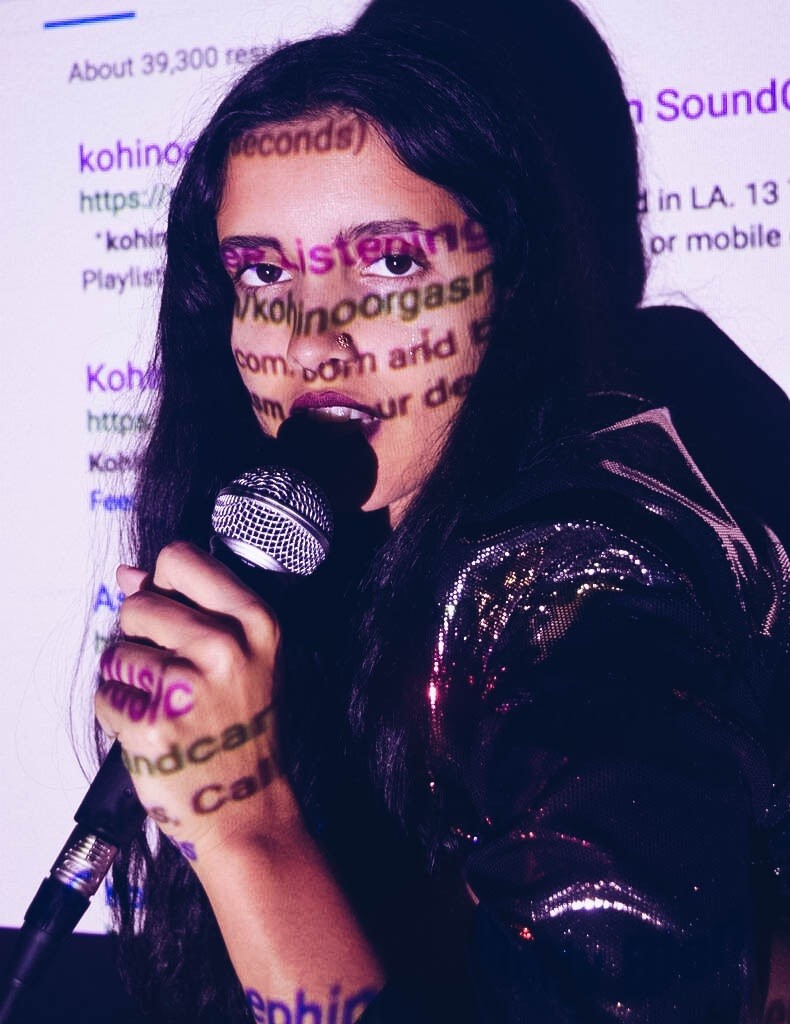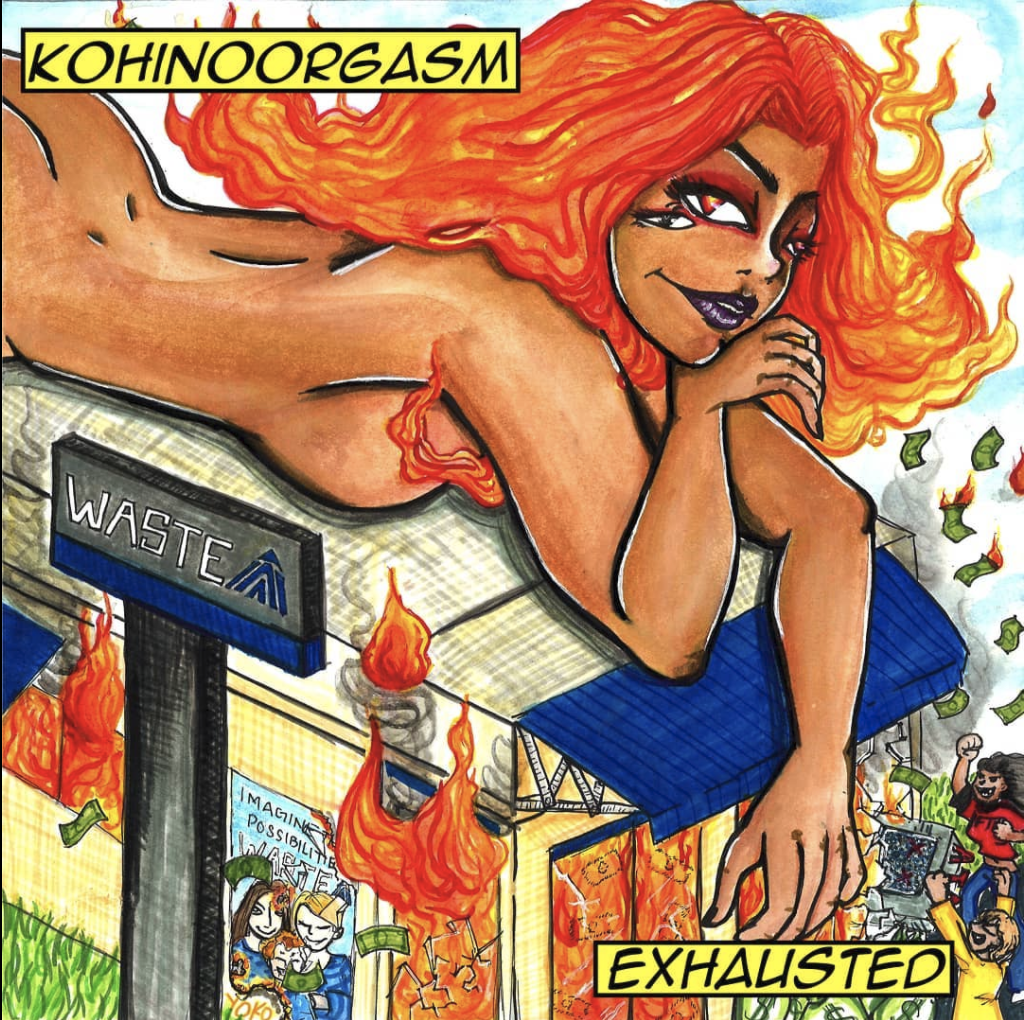MUSIK
Kohinoorgasm

Ord av Abby Fritz
Los Angeles-baserade lo-fi-popartisten Josephine Shetty, känd som kohinoorgasm, utgiven "Utmattad" Mitt i den covid-19-pandemin i sommar. Låten har varit en lång tid på att göra och är en profetisk utrop av hur utbrändhet kan hindra arbetarklassen. Droppande med mjuka vokaltoner och minimalistiska tekno -beats, Singeln resonerar djupt mitt i de senaste månaderna kaos och smärta.
26-Års-gamla Shettys starka känsla av personlig etik lyser genom detta spårproduktion och ger en uppriktig titt på hur de personligen har påverkats av lönearbete som gräsrotskonstnär.
Blanc Magazine talade med Kohinoorgasm om den gemensamma kreativiteten som finns i den underjordiska musikscenen, Hur Covid har påverkat deras kreativa uttryck, och hur de förblir trogna sin kallelse genom sin konst, samhällsorganisation, och utbildning.
När började du göra musik?
"Jag känner att jag har gjort musik hela mitt liv. Jag har alltid haft en affinitet för musik, speciellt för sång. Det var verkligen lugnande för mig som barn och på grund av det föll jag i att göra kreativa aktiviteter i min skola och min kyrka. Men det var alltid egentligen inramat som en hobby, något du kan göra för skojs skull, men jag kände aldrig riktigt att jag förstod min plats i det som en karriär eller livsväg. Det var inte förrän jag gick på college när jag flyttade till Berkeley, och bukten har en så stark DIY-scen. Det var precis rätt tid på rätt plats för mig att vara i Berkeley i 2012 genom 2017. Jag skulle ut på shower, göra saker jag gillar att göra; engagera sig i konst och underground. Och jag blev så förvånad över att se hur fyndiga människor var, som hade en så bred uppsättning musikaliska färdigheter. Det finns människor i tunnelbanan som är klassiskt utbildade och det finns också människor i tunnelbanan som är helt självlärda. Det var verkligen uppmuntrande för mig att känna att min affinitet för musik inte är den typen av imposter syndrom-tänkesätt där du känner att din affinitet för konst inte är lika legitim som någon annans.. Jag ville hedra det genom att driva det mer, så jag började producera. Jag hittade verkligen min stil när jag var mer utsatt för olika typer av DIY elektronisk musikproduktion på den tiden. Jag var som, 'Okej, ja, så här ska jag göra,' och det klickade verkligen."
Hur producerar du din musik?
"Jag är stolt över att producera all min musik, Därmed inte sagt att det är en dålig sak att ta in kollaboratörer och producenter. Jag ser verkligen fram emot att ha kapaciteten och kompetensen att få in fler människor. Men jag började på det sättet eftersom jag också kämpade med min egen sårbarhet i låtskrivandet, och jag kunde verkligen inte förstå att visa dessa saker för en annan musiker. Jag hade också en stark vision från början, Jag ville ha kontroll över musiken. Efter att jag producerade mitt första album som helt producerades och spelades in på GarageBand, Jag visade den för några vänner, Jag la upp några låtar på Soundcloud, och fick väldigt mycket positiv feedback från folk. Men jag kämpade med "Åh, är detta värt att lägga ut? Är det värt alla ansträngningar?" Men då samtidigt, i underjordens anda, Jag tycker att det är så roligt. Varför inte, du vet? det handlade också om att ha autonomi att uppleva något utanför det kommersiella stressområdet. Jag gick vidare från GarageBand till logik, och sedan gillade jag verkligen logik ett tag, nu använder jag Pro Tools. Så det har varit som en evolution."
Hur har din scen påverkat dig som artist?
"Jag är väldigt engagerad i underjorden och jag undrar ofta hur jag ska formulera det eftersom det är något som är mycket viktigt för min praktik. Det är ett etiskt val, ett gemensamt val, ett kreativt val, och även en ärlig representation av mig och vem jag är i min konstpraktik. Jag känner att det finns den här skillnaden, speciellt nu när jag konstruerar mer, Jag känner att jag har byggt en bro för mig själv mellan underground och mer mainstream kommersiellt konstnärskap. Jag tänker mycket på hur mycket artister tvingas in i detta binära av att du antingen är en mycket kommersiell framgångsrik, betalas, resursartad artist eller så är du en självstyrd underjordisk lågavlönad, DIY artist. Underground är verkligen en sådan modell av hur vi skulle älska att musikvärlden skulle se ut, eftersom det innebär att vänner och communitymedlemmar bokar varandra, skapa utrymmen som förhoppningsvis är så säkra som möjligt, som är definierade på våra villkor. Glädjen är på våra villkor, säkerheten är på våra villkor, konstnärskapet är på våra villkor, och arbetet är på våra villkor. Underjorden för mig har varit en strävan mot en modell av kollektiv, queer, BIPOC, utopi. Men samtidigt, underjorden är så fylld av saker som inte är utopi, som missbrukare, rasister, klassister, och människor som poserar som om de har bristande resurser. Men jag bryr mig verkligen om tunnelbanan. Det är musikkulturens gräsrötter och gräsrötterna är alltid där den verkliga grunden för förändring byggs."
"Det är en stor del av varför jag är med och grundar Union of Musicians and Allied Workers, så att vi kan bilda en enad front av musikarbetare. Vi kan förändra branschen och ta itu med dessa frågor som inte bara påverkar musiker och musikarbetare utan påverkar alla arbetare över hela världen. Det är viktigt för mig att vi alla har makten att definiera vår egen kreativitet och lycka och arbetsvillkor. Jag tror att underjorden är ett utrymme där vi får leka med det."
Varför valde du Kohinoorgasmn som ditt scennamn?
"Kohinoorgasm är egentligen bara lekfull. Det är en kombination av orden kohinoor och orgasm. Jag hade svårt att välja ett scennamn när jag ursprungligen släppte min musik. Vid den tiden, Jag trodde inte att det skulle vara något som skulle hålla mig så länge, Men det har visat sig vara ett trevligt namn eftersom det är väldigt sökbart och det är unikt. Det är också roligt att jag gjorde upp mitt eget specialord. Jag ville ha något som hänvisade till avkolonial indisk historia, Men det var också riktigt lekfullt och queering några kulturella troper."
Vad försöker du ta med dig till din publik genom musik?
"När jag gick på gymnasiet, Jag skulle gå till raves och jag var super i elektronisk musik och jag är fortfarande. Jag har riktigt djup respekt för dessa genrer, Särskilt nu när jag lär mig var de banbrytande av svarta musiker. Så, När jag skapade musik för första gången, Jag visste att jag ville göra något som var riktigt ärligt till vem jag är, fredlig och reflekterande men kan också vara rolig och dansbar. En sak som jag inte såg i mycket dansmusik var texter som hade potenta politiska meddelanden. Dansgolvet, klubben, Och disco har varit riktigt politiska utrymmen genom historien. Jag ville hedra det genom att få min egen typ av organisering, politisk bakgrund, och personlig bakgrund till dansmusik som också synkroniseras med mina antikapitalistiska och anarkistiska meddelanden."
Hur har din musik tjänat dig under hela din resa som musiker?
"Det är verkligen katartiskt att skapa musik, Det påminner mig om hur människor pratar om konstterapi. Det känns som när jag sitter ner, så mycket av min musikövning är inte bara att sätta ut musik för Kohinoorgasm. Mycket av tiden försöker jag bara slappna av och få ut lite tankar. Ibland sjunger jag i dagboksstil om min dag, eller om hur jag mår. Jag kommer till och med nynna på melodier som reflekterar känslorna eller stämningarna som jag går igenom. Och det är en riktigt renande praxis."
"Men det är så många saker som att göra musik har gett mig. Jag har fått turnera och träffat många fantastiska människor. Jag känner mig tacksam och privilegierad över att ha fått turnera i tunnelbanan när jag har turnerat utanför västkusten. Det är så häftigt att se hur tunnelbanan fungerar i andra städer och se parallellerna för att se några av de strukturella och estetiska skillnaderna mellan städer."
Du har valt att införliva hindi i många av dina låtar. Vad som föranledde detta beslut?
"Jag växte upp med att lyssna på mycket hindi popmusik och jag kunde inte riktigt relatera till det lyriska innehållet. Jag älskar den lyriska estetiken i mycket hindi popmusik, det är superpoetiskt och romantiskt. Men när jag funderade på att översätta min musiksmak till min egen praktik, Jag ville skapa något som var väldigt personligt för mig. Jag kände att jag svetsade alla mina intressen blev till att jag återerövrade lite hindi-pop-estetik genom att skapa en frodig, hindi, fundersam, omgivande. kvinna stil."
Utövar en stor del av ditt förhållande till musik? Om så är fallet, hur har covid-19 förändrat din förmåga att prestera?
"Jag tror att många artister har ett komplicerat förhållande till att uppträda. Jag älskar att uppträda, fast, men jag känner också att det är utmattande. Det var ett år som jag tillbringade nästan hela året på resande fot. Det var den mest resande jag någonsin gjort i mitt liv, men det är utmattande och det är svårt att behålla stabiliteten. Det slutade med att jag fick ge upp min bostad för att åka på turné. Det är destabiliserande att åka på turné som gräsrotsartist och låginkomstartist. Men jag älskar att uppträda och jag saknar det verkligen mycket."
"Men jag njuter också verkligen av denna stund, det har varit skönt att ha en paus från att prestera lite för att bara fokusera mer på skrivandet, för i slutändan, Jag vill framföra nya låtar och det betyder att jag måste sätta mig ner och skriva. Det är intressant att utföra på zoom och att utföra virtuellt. Jag är inte alls emot det och jag ser fram emot hur jag kan tycka om att förnya det mediet. Jag har sett några människor göra riktigt coola saker och det är bara så spännande att se hur kreativa personer blir kreativa när en helt ny omständighet kastas på dem."
"Utmattad" släpptes i slutet av maj, under en tid av mycket oro över hela världen. Var detta en del av det som sporrade skapandet av låten? Om inte, vad gjorde?
"Jag skrev faktiskt den låten för flera år sedan och har suttit på den länge. Tidpunkten för släppet var helt slump. Det är bara något jag har reflekterat över mycket. Det är ett svar på hur dränerande, exploaterande, och deprimerande lönearbete är. Jag tror att låten släpptes runt karantänens tid kändes relatabel eftersom många av oss hade dessa existensiella tankar om arbete. Vad betyder det att vi plötsligt arbetar hemifrån? Jag känner till att många aktivister för funktionshinder som har kämpat i flera år och nu bara för att kapabla människor behöver gå hem och arbeta, Det är lätt att gå och arbeta avlägset. Många existentiella tankar har kommit upp runt arbete, lönearbete, och regeringen stöder inte arbetarklassen."
Hur har din kreativa process påverkats av karantän och den kollektiva ilskan i stora delar av landet?
"Det har återupplivat min passion för att göra dansmusik som är infuserad med verkliga antikapitalistiska anekdoter om mitt liv som arbetande konstnär."
"Våra regeringar vill att vi ska återuppta affärer som vanligt, Även om det finns rättmätiga uppror, rättmätig kollektivt raseri, och också en livshotande pandemik. Detta påverkar mig som musikarbetare eftersom hur kan jag bara fortsätta skriva musik, Making Music, Går till skolan för musik, och undervisa musik när allt detta händer? Men jag skulle säga att det är där facket kommer in. Det är bara så viktigt om du ska göra någonting, Du bör också organisera inom det området."
Vad är några förhoppningar du har för framtiden för din musik?
"Jag kommer alltid att skapa musik. Jag hoppas att jag bara får fortsätta göra det, Även om det inte släpps. Jag hoppas att vi alla kan leva i en värld där vi trivs och inte behöver oroa dig för överlevnad så mycket som vi gör. Det är den situation som våra regeringar sätter in oss, Men jag tror att när fler människor skapar konst, Det är ett bra tecken på att människor utnyttjar sin kraft."



